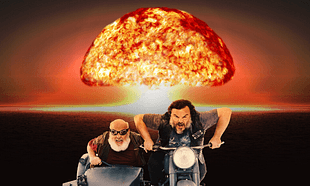It's a popular conception that ¡Tré! caps a Green Day vanity project, the final installment of a trilogy (¡Uno! ¡Dos! ¡Tré!) which could surely have been whittled down to one effective album. Furthermore, churning out so much material over a short period tends to dilute rather than enhance musical potency, overwhelming even loyal fans. Accusations of self-importance and wilful neglect of quality control notwithstanding, ¡Tré! actually emerges polished and worthy. Studio album number eleven closes a chapter opened by 2004's American Idiot and cements Green Day's break with the pretence of high art.
Frontman Billie Joe Armstrong cites the ¡Uno! ¡Dos! ¡Tré! recording sessions as Green Day at their "most prolific and creative". ¡Tré! is not coherent enough to be pure power-pop, but following mixed forays in to garage rock, dance-punk and hip-hop, it offers a reassuring familiarity for first generation fans. Nonetheless, experimentation has been a calling card of the Californian punk-poppers since 1997's Nimrod, and so ¡Tré! 's curiosities aren't hugely surprising. ‘Brutal Love' is classic R&B through the prism of Green Day power chords (the melody belongs to Sam Cooke), a kind of power-pop doo-wop. It's a startling opener, but it works. There's an awkward curtain call at the album's opposite end, as the piano-driven ‘The Forgotten' functions as a maudlin, incongruous and conspicuously earnest coda. Elsewhere, 'Dirty Rotten Bastards' echoes Green Day's rock opera phase. A six minute jumble lacking any distinct thread, it gets away with being as unsubtle as it is energetic.
It's for Dookie (1994) and Insomniac's (1995) snotty punk masterclasses that the trio (now expanded to a quartet following the official inclusion of long-time guitarist Jason White) made their name. Happily, ¡Tré! acknowledges this. ‘Missing You', ‘Sex, Drugs & Violence' and ‘99 Revolutions' are throwbacks to the three-chord days. Guitars zing and all constituent parts are present, but the formulaic songs write themselves and fail to surpass the band's mid-nineties benchmark. Whether it's the sanitised sheen of Rob Cavallo's production or the infrequency of Billie Joe's brash snarl, these tunes avoid limp filler status but will forever languish in the shadow of ‘Welcome to Paradise', ‘Basket Case‘ or ‘Walking Contradiction‘.
There are other positives: ‘8th Avenue Serenade' is short, sharp power-pop, slightly atypical of the band's sound, while ‘X-Kid''s reflective pop-rock (illustrating how today's incarnation of Green Day see themselves) also hits the mark. ¡Tré! chugs along in a pleasingly back-to-basics manner. It's a less overblown piece from punk-pop survivors who have been around, it should be noted, for over a quarter of a century. One can only speculate whether a single album could have returned the band to its roots more emphatically, but it's comforting to have Green Day revisit what Green Day always did best.
Review by Killian Barry







































































